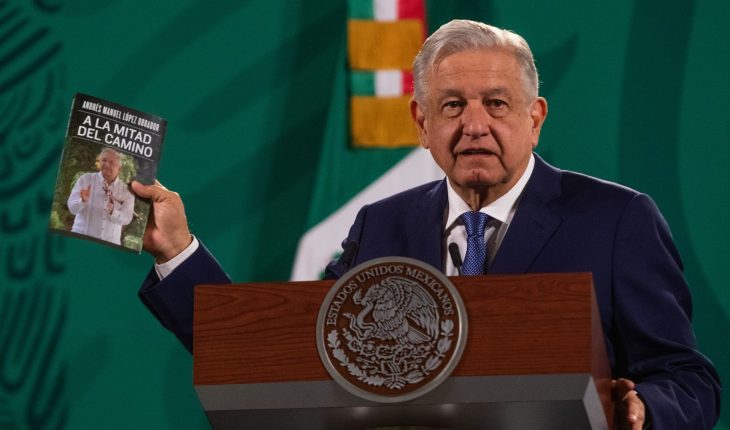President Andrés Manuel López Obrador’s most recent book, A mitad del camino, published by Planeta, is not only a portrait of the president’s idea of a country and a self-assessment of his government, but also contains unpublished information on matters of national security, foreign policy and tax collection.
For example, the president revealed the facsimile of a letter sent to him by the former secretary of National Defense in the penyista six-year term, Salvador Cienfuegos, shortly after his arrest in the United States on alleged charges of drug trafficking and money laundering. In the manuscript, the general told López Obrador that his detention had been humiliating and that he did not have enough money to pay for his defense in the United States.
The book also includes an unpublished report by the Ministry of National Defense (Sedena) on evo Morales’ rescue mission after the coup d’état in Bolivia, for which Mexico sent an official aircraft. The document reveals that, when the plane took off from the Cochabamba airport, with the president and his entourage on board, Bolivian soldiers launched a rocket at it in an attempt to shoot it down.
López Obrador also reveals that his administration reached an agreement with the companies that manage prisons so that, at the end of the current contracts (of 22 years), the prisons become the property of the government.
Halfway also includes a report from the Tax Administration Service (SAT) that reveals a list of the 58 large taxpayers most benefited from forgiveness during the six-year terms of Felipe Calderón and Enrique Peña Nieto.
The list of beneficiaries includes the names of companies whose owners are now advisors to President López Obrador, such as Grupo Salinas –of Ricardo Salinas Pliego−, which was forgiven 7,775 million pesos, mainly in the penyism; Deacero -by Sergio Gutiérrez-, who had forgiveness for 1,993 million pesos, all with Peña Nieto; and Grupo Financiero Banorte -of Carlos Hank González-, which was forgiven 1 thousand 436 million pesos in the penyism.
The attack against Evo
During the rescue mission of former President Evo Morales after the coup d’état in Bolivia in November 2019, the military of that country launched a rocket from the ground at the Mexican government aircraft where the deposed president was traveling with the intention of shooting him down.
The attack was carried out with a Russian-made RPG-7 rocket launcher, which is designed to destroy tanks and is also capable of shooting down aircraft (it has been used by terrorist organizations to bring down US and NATO helicopters). In Mexico, the Jalisco Cartel shot down an Air Force helicopter with one such missile in 2015.
The Mexican crew, led by the military, managed to elude the projectile launched by Bolivian soldiers as the official aircraft, a Gulfstream G550 jet, from the Chimoré airport in Cochabamba began to take off.
The revelation is part of an unpublished report prepared by the Secretariat of National Defense (Sedena), in charge of executing Morales’ rescue plan, and which was included in President Andrés Manuel López Obrador’s most recent book, A mitad del camino, published by Planeta.
“Evo said that we had saved his life; I thought that expression was just a gesture of gratitude for our solidarity, but when the Secretary of Defense gave me the report on the details of the operation, I realized the great risk that had been taken,” López Obrador writes.
The Sedena report was made from the statements of the military directly involved in the “Bolivia Mission”: the crew aboard the Gulfstream G550 that traveled from Mexico City to the South American country in the early morning of November 11, 2019, after the coup d’état led by conservative groups in that country in collusion with the Army.
The crew was made up of General Aviator Pilot Miguel Eduardo Hernández Velázquez, Lieutenant Colonel pilot aviator Felipe Jarquín Hernández, and Second Captain Julio César Sánchez Ruperto. His duties would be, respectively, those of pilot, co-pilot and on-board mechanic. They were accompanied by Froylán Gámez Gamboa, from the Directorate of Special Affairs of the Undersecretariat for Latin America and the Caribbean of the SRE, as diplomatic representative of Mexico.
The aircraft landed almost seven hours later at the Lima airport, waiting for authorization to enter Bolivian airspace and land at the Chimoré airport in Cochabamba.
After hours of negotiation between the representative of the Foreign Ministry and the new Bolivian authorities, permission was obtained to fly to Bolivia, where they landed at 7:00 p.m. hours (Mexico time) of November 11.
According to the account of the crew, when landing at the Chimoré airport, on both sides of the taxiway, “there was an abundant presence of military personnel and armed civilians watching the aircraft.”
After parking on the service platform and turning off the engines, General Hernández – who was piloting the aircraft – asked the crew to remain on board and descended unarmed, so as not to provoke “misinterpretations”.
The Mexican plane was boarded by Evo Morales 45 minutes later, accompanied by Vice President Álvaro García Linera and the then Minister of Health, Gabriela Montaño.
“At that time, Mexicans felt relief, half the work was already done; what they ignored was that this had been the easy half, now it was necessary to complete the most difficult and complicated part of the mission: to take Mr. Evo Morales and his companions to Mexico guaranteeing their safety,” says the military report cited by López Obrador in his book.
On behalf of Peru, the crew received authorization to fly to the Lima airport, but, when the aircraft was a few moments away from starting takeoff, from the control tower of the Chimoré airport they were informed that they did not have permission, so they were ordered to return to the service platform, where they noticed “an increased activity of armed personnel and artillery vehicles on both sides of the runway.”
The Mexican pilot, General Hernandez, got off the aircraft and tried to make a call, when he was surrounded by three armed men wearing the uniform of the Bolivian Army. From then on the situation became tense.
“Ordering one of them (the pilot general) to raise his arms, telling him that they would get Evo Morales off his plane. At that moment, another of the individuals approached him from behind and hit him in the lower back with the butt of a long Garand-type weapon, so the pilot turned to the left to face him, at which time another of the individuals, also uniformed, hit him in the abdomen with the flamethrower of a light automatic rifle, carrying his gun and pointing it at his chest for no apparent reason motivating action,” the report says.
The Mexican general reasoned with the soldier who was pointing at him telling him that “the brave do not murder”, after which he lowered his weapon.
More armed men arrived, some in uniform and others in plain clothes, surrounded the aircraft. Nearby, at 150 meters, a man with an RPG rocket launcher was stationed, pointing at the plane.
General Hernandez instructed his crew to close the window blinds of the passenger cabin and keep the door sealed.
The leader of the Bolivian group again insisted “on his intentions to enter the aircraft to extract the three people of Bolivian nationality who were on board.” The pilot general got in the way of the access ladder and replied that he could not give him access because, according to international law, the aircraft, being ostensibly owned by the Mexican Air Force, must be considered within its jurisdiction.
After several negotiations, General Hernández managed to get him in touch by telephone with a commander who identified himself as General Tercero Lara, commander of the Bolivarian Air Force, to whom the Mexican pilot explained that the reason for his stay in his country was to carry out a humanitarian mission in compliance with an order.
The Bolivian general acceded to his request with an annoyed attitude; he told him he had 30 minutes to leave his country’s airspace, after which, he warned, “he would not answer for the safety of the occupants or for the integrity of the aircraft.”
At the behest of General Tercero Lara, the Bolivian soldiers were ordered to allow takeoff, and, particularly, the soldier holding the RPG rocket launcher was asked to stop targeting the Mexican aircraft. The man obeyed, momentarily.
When the jet was just taking off, with Evo Morales and his entourage on board, he launched a missile, which the pilot managed to dodge. The Sedena report details the scene:
“Having started filming at 20:55 hours (local time in Mexico), they took off at 21:01; during the initial ascent, the pilot managed to observe, from the left side of the cockpit, and when they almost reached 1,500 feet above the ground, a luminous wake similar to the characteristic of a rocket in the position of seven (back and left of the trajectory of the aircraft) below the horizon, the pilot estimating that, in the case of a projectile, the point from where it was launched could be located in the vicinity of the Cochabamba airport, so he made a tight turn towards the opposite side of the trajectory of the projectile (right side), increasing the rate of ascent to avoid impact, observing that the trace, far below the aircraft, made a parable towards the ground without having reached the height that at that time they already had, approximately, of 3,000 feet on the ground, concluding his assessment that the possible rocket could have come from the RPG launcher he observed at the airport; regarding this situation, he decided to refrain from communicating to the crew to avoid increasing the existing tension and to be able to stay focused on the already complicated flight.”
After having left Morales and his entourage safe in Mexico, after 24 hours without sleep, the military crew was decorated by President López Obrador.
What we do at Animal Político requires professional journalists, teamwork, dialogue with readers and something very important: independence. You can help us keep going. Be part of the team.
Subscribe to Animal Político, receive benefits and support free journalism.#YoSoyAnimal





